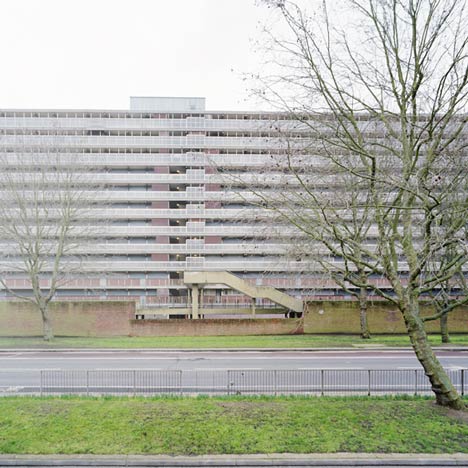Bartlett lecturer and photographer Simon Kennedy has sent us his photographs of a deserted south London housing estate awaiting demolition.
The photographs focus on the communal spaces in and around the run-down estate and were exhibited at the Bartlett School of Architecture last month.
Images are © Simon Kennedy.
See all our photography stories »
Here's some more information from architectural historian Ben Campkin:
The Heygate Estate in South London was completed in 1974. The estate now stands empty and awaiting demolition.
635 x 508: Heygate Abstracted is a photographic installation, a result of numerous visits to the estate through 2010. A large format camera was used to photograph and re-photograph specific views and locations around the public areas of the estate. The spaces within the photographs were then analysed and augmented."
‘There is another Modernism well worth rescuing from the dustbin of history and the blandishments of heritage . . . [T]he Left Modernisms of the 20th century continue to be useful: a potential index of ideas, successful or failed, tried, untried or broken on the wheel of the market or the state. Even in their ruinous condition, they can still offer a sense of possibility which decades of being told that ‘There is No Alternative’ has almost beaten out of us.’[Owen Hatherley, Militant Modernism, Winchest and Washington, Zero Books, 2008, p. 13.]
Heygate Abstracted
Simon Kennedy’s photographs of the Heygate Estate prompt us to contemplate not the failure of modernism, but the failure of the failure of modernism, and the possibilities for reclaiming a mode of utopian urban thinking. In doing so they provide a visual elaboration of a prominent theme in contemporary architectural debate.
At a time of acute shortage of affordable housing, the photographs make us question the validity of the decision by Southwark Council to demolish these buildings—are they essentially and irretrievably a failure?
In their guide to the architecture of south London Bridget Cherry and Nikolaus Pevsner struggle to make sense of the estate, built between 1968 and 1974. Clearly impressed by the visual impact of its slabs and the gargantuan social ambition of the London Borough of Southwark Architects’ scheme, they also categorise the Heygate as one of ‘the most notorious products of industrialised building’.[Bridget Cherry and Nikolaus Pevsner, The Buildings of England. London 2: South, London, Penguin Books, 1983/2001, p. 562.]
Few London locales have become so linked with postwar ‘modernism in ruins’ as the Elephant and Castle, a neighbourhood long stigmatised through an iconography of material and social ‘blight’ and ‘brutality’, an inner-city intersection with a vast stock of council housing, the physical deterioration of which attests to its being mostly by-passed, along with the area’s residents, by the wealth circulating in late-modern London.
Kennedy’s photographs emphasise the consequences of the painfully protracted if not perpetual contemporary ‘regeneration’ process which has left homes and shops conspicuously vacant for years on end.
They show an urban landscape of quasi-ruins, attractive to photographers and journalists through the spectacle of ‘sink’, to use the term Tony Blair problematically applied to the Heygate’s sister Aylesbury Estate, PR birthplace of New Labour government.
Trained as an architect, Kennedy’s gaze fixes on the formal qualities of the estate’s exteriors and public spaces, selecting architectural moments, abstracting views and elevations, in a process that disassociates these buildings from their contentious histories, and any sense of domestic life.
The result is that the photos capture something of the essence of the original blueprints. Yet an air of pathos pervades, emptiness is the striking feature of this catalogue of intended social spaces.
These qualities have particular resonance now, of course, at a time of accelerated state withdrawal from housing provision, and changes to housing benefit policy that will force those on low-incomes towards the periphery of the city.
© Ben Campkin
See also:
.
| Shophouses 4 x 8 m Bangkok by Peter Nitsch | More photography on Dezeen |
More architecture on Dezeen |

